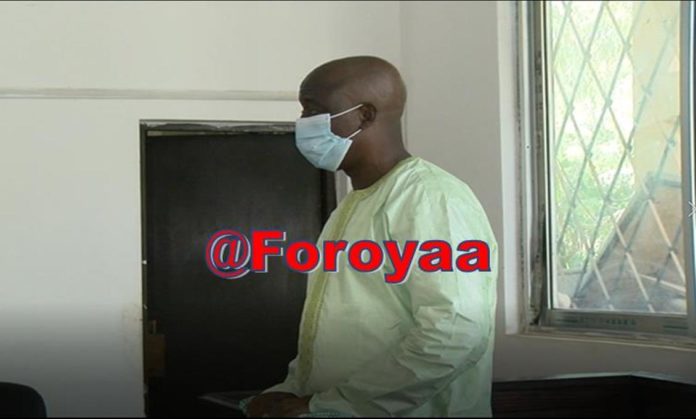By Yankuba Jallow / Nelson Manneh
Lawyer Kimbeng T. Tah who appeared for the Attorney-General, on Wednesday 21st October 2020 said Yankuba Touray’s claimed ‘constitutional immunity’ is invalid.
Barrister Tah said Touray’s lawyer relied on the wrong provision of the Constitution by virtue of an amendment of Schedule Two of the 1997 Constitution which was declared invalid by the Supreme Court of the Gambia in 2001.
Lawyer K. Tah said by virtue of the Supreme Court decision in the case of Kemeseng Jammeh and the Attorney-General which is suit number 4 of 2001, Clause 13 (1) of the Second Schedule of the 1997 Constitution as it is currently in the laws of the Gambia 2009, is invalid.
Lawyer Tah said the amendment on Clause 13 (1) of the Constitution was declared null and void by the Supreme Court because the National Assembly acted in excess of their powers to make such amendments; that the provision of Clause 13 (1) of the Constitution as it is in the 2009 revised laws of The Gambia is that “no member of the Armed Forces Provisional Ruling Council or any person appointed Minister by the Armed Forces Provisional Ruling Council or other appointees of the Armed Forces Provisional Ruling Council, shall be held liable or answerable before a Court or authority or under this Constitution or any other law, either jointly or severally, for an act or omission in the performance of his or her official duties.”
The Senior State Counsel said the amendment in 2001 introduced the word “answerable” to the original provision of Clause 13 (1), which was later declared invalid by the Supreme Court in the above mentioned case.
Retired Captain Yankuba Touray, wants the Banjul High Court to enforce the Constitutional immunity accorded to him by the 1997 Constitution. However, State lawyer Kimbeng T. Tah objected saying this is premature.
Counsel Tah drew the Court’s attention to the difference between the words ‘answerable’ and ‘liable’.
Touray was a member of the defunct AFPRC Government and was a long-serving Minister of Local Government and Lands under both the AFPRC and APRC regimes. The retired military officer is the third defense witness in his trial where he is accused of murder.
According to the indictment, Touray murdered ex-Minister of Finance Ousman Koro Ceesay in 1995 at his residence in Kololi. Touray pleaded his constitutional immunity but the Court entered a plea of not guilty on his behalf.
Counsel Tah’s submission followed Lawyer Abdoulie Sisohor’s application on Monday, 12th October 2020, for the High Court to enforce the constitutional immunity accorded to Yankuba Touray by the 1997 Constitution.
Lawyer Sisohor said the murder charge that the ex-Minister of Local Government and Lands is facing, was illegal and contrary to the 1997 Constitution. He argued that the powers of the High Court to try retired Captain Yankuba Touray has been taken away by the 1997 Constitution which according him, provides immunity to Yankuba Touray and all other members of the erstwhile AFPRC Government including Ministers, from legal proceedings whether civil or criminal, of things they did between 1994 and 1996.
“I pray that the Court strike out this case because it is illegal and it infringes the rights of the accused person. I humbly submit that the accused person should be discharged because it is illegal to try him under the current Constitution,” Lawyer Sisohor said.
Senior Lawyer Sisohor relied on the case of Antoine Bana and Ocean View Resort wherein it was held that the issue of jurisdiction can be raised at any time and in any manner, whether formally or informally; that once so raised, all proceedings must be suspended and the Court should address it.
The senior lawyer relied on the testimonies of prosecution witnesses including the testimonies ex-Corporal Alagie Kanyi, Captain Jangum, Ensa Mendy and Lamin Ndour, who all testified before the Court as prosecution witnesses in the case, and also relied on Yankuba Touray’s testimony.
The Lawyer submitted that all the witnesses before the Court indicated that Touray was a member of the Armed Forces Provisional Ruling Council (AFPRC).
Lawyer Sisohor argued that Section 13 (1) and (5) of Schedule 2 of the 1997 Constitution accords Yankuba Touray immunity from civil and criminal proceedings of his actions or omissions between 1994 and 1996.
Section 13 (1) of Schedule Two of the 1997 Constitution provides that “no member of the Armed Forces Provisional Ruling Council, or any person appointed Minister by the Armed Forces Provisional Ruling Council or other appointees of the Armed Forces Provisional Ruling Council, shall be held liable or answerable before a Court or authority or under this Constitution or any other law either jointly or severally, for an act or omission in the performance of his or her official duties.”
Section 13 (5) of the same Schedule of the Constitution provides the following: “It shall not be lawful for any Court or tribunal to entertain an action instituted in respect of an act or omission against a person acting or committing to act on the instructions or authority of the Armed Forces Provisional Ruling Council or a member thereof, and alleged to be in contravention of any law whether substantive or procedural, in existence before or during the administration of the Armed Forces Provisional Ruling Council.”
“I humbly submit that the application is not about interpretation but enforcement of the right of the accused person Yankuba Touray, not to be prosecuted,” he said; that “by virtue of Sections 13 (1) and (3) of Schedule Two of the 1997 Constitution, the powers of this honorable Court are ousted to try the accused person.

















